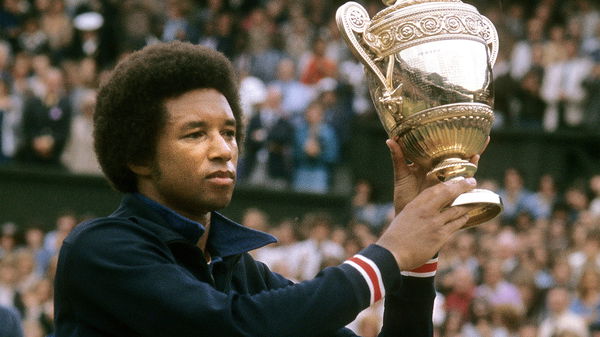

Tennis is a sport that has often been deemed too “white” by many of its players. When describing it as such, the term usually means that it is an expensive sport, mostly reserved for the privileged class. While that was the situation when the sport began, there has been immense change over time, mainly because of Arthur Ashe.
In the WTA, there have been many women who came from underprivileged backgrounds to create history. Serena Williams and Venus Williams are the most famous examples, with Coco Gauff being the most recent one.Frances Tiafoe is a great example of this in the ATP. However, all these stars owe a great deal to Arthur Ashe, who was the last black American tennis player to win a grand slam.
ADVERTISEMENT
Article continues below this ad
The glorious career of Arthur Ashe
Arthur Ashe began playing tennis when he was just 16 years old. While he didn’t see great results at the start of his career, he kept playing and eventually played his first Grand Slam final in the 1966 Australian Open, when tennis was still in the Open Era. He would appear in the final once again in 1967, but he couldn’t win it once again.

As tennis transitioned to the Open Era, Ashe found his way into the US Open final and won the tournament, shocking the world. He then won the Australian Open in 1970 and then the Wimbledon in 1975. In doubles, Ashe won two out of the five doubles Grand Slam finals he played, the French Open in 1971 and the January edition of the 1977 Australian Open.
Ashe became the last African-American athlete in the ATP to win a men’s singles Grand Slam in 1975 and a men’s doubles Grand Slam in 1977. After him, many black ATP stars came up but failed to win any majors.
While Arthur Ashe became a beacon of equality after his retirement, during his prime tennis-playing years, he was anything but a socially active individual.
ADVERTISEMENT
Article continues below this ad
How Ashe eventually became a beacon of equality in the US
When a young and starry-eyed Ashe stepped into the thick of the sport, tennis was the only thing on his mind. While he grew up in a city that practiced segregation and was denied access to tennis courts when young, Ashe had no desire to take a big political stance. He was criticized by former Shadow US Senator Jesse Jackson and even Billie Jean King for his lack of clarity on his political standing.
However, he changed his mind in 1970, when his visa application was rejected, at a time when the apartheid was in full effect in South Africa. It would happen again in 1971 and then in 1972. He was eventually allowed to play in the country in 1973, but the experience had changed him.
“I looked apartheid directly in the face, saw the appalling WHITES ONLY and NONWHITES ONLY signs, the separate and drastically unequal facilities very much like those of my childhood in Virginia,” Ashe wrote. He continued, “I saw the sneer of superiority on the faces of many whites, and the look of obsequiousness, fatalism, cynicism, and despair on the faces of many blacks.”
ADVERTISEMENT
Article continues below this ad
The experience left him in despair, and he decided a change needed to be made. He decided to use his position as a public figure to speak out against the apartheid and the discrimination plaguing the US. He continued his tennis career and became the first African-American male athlete to be crowned a Grand Slam.
Watch This Story – Serena Williams pays tribute to Roger Federer
ADVERTISEMENT
ADVERTISEMENT
ADVERTISEMENT
ADVERTISEMENT

